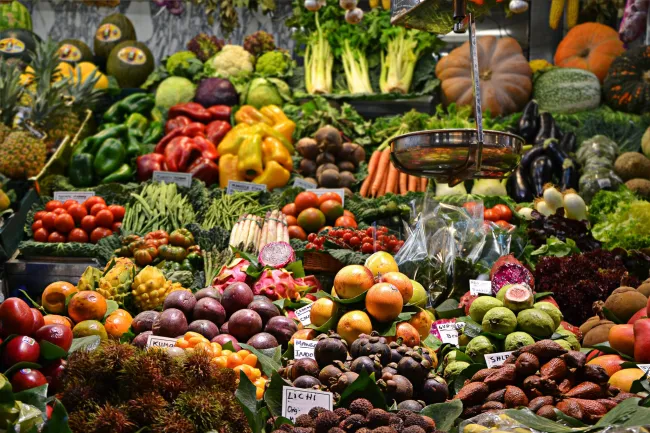This paper uses data on the real life (as opposed to modelled) dietary practices of vegans, vegetarians and meat eaters to compare environmental impacts across all major environmental measures. The paper links one of the largest datasets available on the true dietary practice of different self-identified dietary groups (vegan, vegetarian, meat eater etc.), with data on the environmental impact of 589 foods across ten environmental measures from 570 life-cycle assessments.

Whilst previous papers have modelled diet types based on assumptions about dietary practice, this paper provides a more accurate account of environmental impact by using self-reported dietary practice data collected through food diaries. In addition, the analysis takes into account variations in environmental impact due to different sourcing and production methods. In using a large survey data set on self-identified vegans, vegetarians and fish-eaters in the UK, the paper ensures that real dietary patterns, including those that breach some of the definitions of the groups, are included in the analysis, rather than on idealised groups.
For GHG emissions, land use, water use, eutrophication and biodiversity, impacts are determined by the amount of animal-based products in any given diet, regardless of calories, sourcing, production and/or metric used (see the diagram below). The impact of a vegan diet was 25% that of a high meat-eater for GHG emissions and around 34% for biodiversity. Three important findings were generated thanks to the use of self-reported dietary practices and the accounting for differing sourcing and production methods. Firstly, the calorie content of diets is higher in meat-eaters than in vegetarians and vegans, and high meat-eaters have higher measured calories intake than low meat-eaters. This amplifies the disparity in environmental impact between meat eaters and non-meat eaters if using actual kilocalories consumed. However, even when standardised to 2,000 kcal there are still pronounced differences in environmental impact between high meat eaters, meat eaters and vegetarian/vegans. Secondly, even within meat eating diets there is significant variance depending on the volume of consumption; for example high meat-eaters were found to generate almost twice as much CO2 as low meat eaters. Third, despite substantial variations in environmental impacts caused by sourcing and production, the paper found a consistent negative relationship between environmental impacts and proportion of animal-based food consumption in all cases. Finally, the paper compared the impact of greenhouse gas emissions from respective diets using three metrics: GTP100, GWP100 and GWP20. These three metrics consider the effect on global temperature over different time periods and therefore place varied emphasis on methane emissions. Even in the scenario that places least emphasis on the warming potential of methane, the emissions associated with a medium meat-eater’s diet were 2.5x those associated with a vegetarian diet.

Image: Fig. 3, Scarborough et. al., 2023. Relative environmental footprint from GWP100, land use, water use, eutrophication potential and biodiversity impact of diet groups in comparison to high meat-eaters (>100 g d−1).
The paper concludes that in order for the UK to reach its emissions reduction goals, specifically the legal commitment to 78% GHG emissions reductions by 2035, major dietary change will be required. Other research has demonstrated that reducing the environmental impact of food systems through new technologies, improved yields and reduced waste could reduce emissions by up to 15%. However, this research reinforces evidence that far larger reductions can be achieved byreducing animal-based food consumption and that this will be necessary to reach GHG emissions targets. The paper ends by offering some policy recommendations for implementing this transition in the UK, including mandatory food labelling, regulation of promotions and taxation on high-carbon foods.
Abstract
Modelled dietary scenarios often fail to reflect true dietary practice and do not account for variation in the environmental burden of food due to sourcing and production methods. Here we link dietary data from a sample of 55,504 vegans, vegetarians, fish-eaters and meat-eaters with food-level data on greenhouse gas emissions, land use, water use, eutrophication risk and potential biodiversity loss from a review of 570 life-cycle assessments covering more than 38,000 farms in 119 countries. Our results include the variation in food production and sourcing that is observed in the review of life-cycle assessments. All environmental indicators showed a positive association with amounts of animal-based food consumed. Dietary impacts of vegans were 25.1% (95% uncertainty interval, 15.1–37.0%) of high meat-eaters (≥100 g total meat consumed per day) for greenhouse gas emissions, 25.1% (7.1–44.5%) for land use, 46.4% (21.0–81.0%) for water use, 27.0% (19.4–40.4%) for eutrophication and 34.3% (12.0–65.3%) for biodiversity. At least 30% differences were found between low and high meat-eaters for most indicators. Despite substantial variation due to where and how food is produced, the relationship between environmental impact and animal-based food consumption is clear and should prompt the reduction of the latter.
Reference
Scarborough, P., Clark, M., Cobiac, L., Papier, K., Knuppel, A., Lynch, J., Harrington, R., Key, T. and Springmann, M., 2023. Vegans, vegetarians, fish-eaters and meat-eaters in the UK show discrepant environmental impacts. Nature Food, pp.1-10.
Read the full article here and for more on the impact of food systems on the environment see our explainer.




Comments (0)